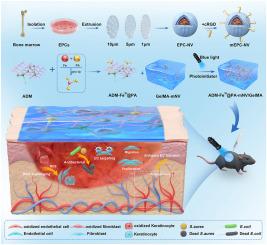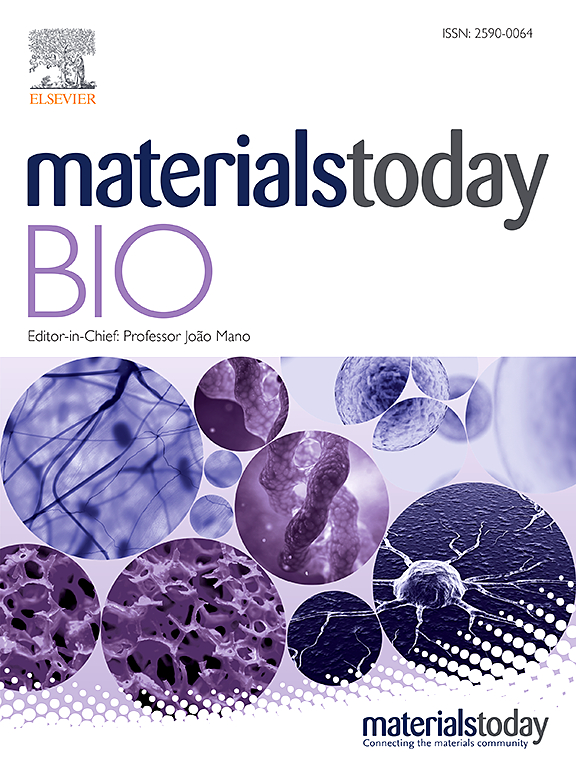Engineered biomimetic nanovesicles-laden multifunctional hydrogel enhances targeted therapy of diabetic wound
IF 8.7
1区 医学
Q1 ENGINEERING, BIOMEDICAL
引用次数: 0
Abstract
Angiogenesis is essential for diabetic wound healing. Endothelial progenitor cell-derived extracellular vesicles (EPC-EVs) are known to promote wound healing by enhancing angiogenesis, while the low yield and lack of effective targeting strategies limit their therapeutic efficacy. Here, the biomimetic nanovesicles (NVs) prepared from EPC (EPC-NV) through an extrusion approach were reported, which functioned as EV mimetics to deliver contents from EPC to the wound. Besides, the cRGD peptide was coupled to the surface of EPC-NV (mEPC-NV) to achieve active endothelial cells (ECs)-targeting. Furthermore, we developed a dual hydrogel network by combining Fe3+@ Protocatechualdehyde (PA) complex-modified Acellular Dermal Matrix (ADM) with light-cured gelatin (GelMA), to enrich and sustainably release mEPC-NV. The hydrogel system with antioxidant and antibacterial properties also made up for the deficiency of mEPC-NV, reducing reactive oxygen species (ROS) and inhibiting infection in diabetic wound. Taken together, this study established a novel bioactive delivery system with angiogenesis, antioxidant and antibacterial activities, which might be a promising strategy for the treatment of diabetic wound.

含有生物仿生纳米微粒的多功能水凝胶可提高糖尿病伤口的靶向治疗效果
血管生成对糖尿病伤口愈合至关重要。众所周知,内皮祖细胞衍生的细胞外囊泡(EPC-EVs)可通过增强血管生成促进伤口愈合,但其产量低和缺乏有效的靶向策略限制了其疗效。本文报道了通过挤压方法从EPC制备的生物仿生纳米囊(NVs)(EPC-NV),它可作为EV模拟物将EPC中的内容物输送到伤口。此外,我们还将 cRGD 肽耦合到 EPC-NV (mEPC-NV)表面,以实现活性内皮细胞(ECs)靶向。此外,我们还开发了一种双重水凝胶网络,将Fe3+@原儿茶醛(PA)复合物修饰的细胞真皮基质(ADM)与光固化明胶(GelMA)结合起来,以富集并持续释放mEPC-NV。具有抗氧化和抗菌特性的水凝胶系统还能弥补 mEPC-NV 的不足,减少活性氧(ROS)并抑制糖尿病伤口感染。综上所述,本研究建立了一种具有血管生成、抗氧化和抗菌活性的新型生物活性递送系统,这可能是治疗糖尿病伤口的一种有前途的策略。
本文章由计算机程序翻译,如有差异,请以英文原文为准。
求助全文
约1分钟内获得全文
求助全文
来源期刊

Materials Today Bio
Multiple-
CiteScore
8.30
自引率
4.90%
发文量
303
审稿时长
30 days
期刊介绍:
Materials Today Bio is a multidisciplinary journal that specializes in the intersection between biology and materials science, chemistry, physics, engineering, and medicine. It covers various aspects such as the design and assembly of new structures, their interaction with biological systems, functionalization, bioimaging, therapies, and diagnostics in healthcare. The journal aims to showcase the most significant advancements and discoveries in this field. As part of the Materials Today family, Materials Today Bio provides rigorous peer review, quick decision-making, and high visibility for authors. It is indexed in Scopus, PubMed Central, Emerging Sources, Citation Index (ESCI), and Directory of Open Access Journals (DOAJ).
 求助内容:
求助内容: 应助结果提醒方式:
应助结果提醒方式:


